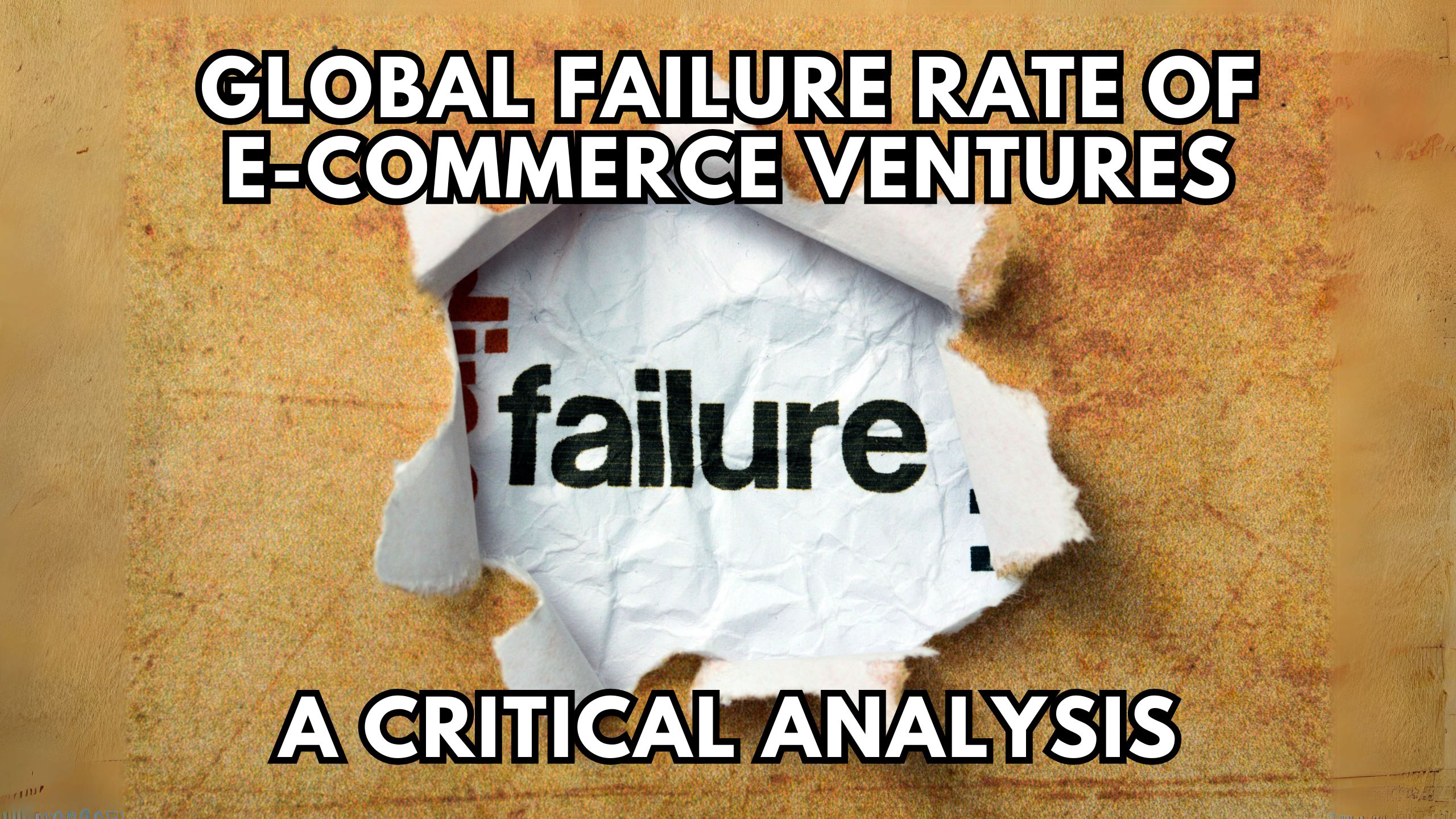Global Failure Rate of E-commerce Ventures: A Critical Analysis


Global Failure Rate of E-commerce Ventures: A Critical Analysis
In the ever-evolving landscape of e-commerce, businesses face multifaceted challenges that contribute to a notable failure rate. This comprehensive analysis explores the various factors influencing the failure rate of e-commerce ventures, shedding light on critical aspects that businesses need to navigate.
Factors Influencing the Failure Rate of E-commerce Ventures
1. Market Saturation and Competition
In highly saturated markets, new e-commerce ventures often struggle to differentiate themselves. Fierce competition can lead to price wars, diminishing profit margins, and a struggle to capture a meaningful market share.
2. Inadequate Market Research and Understanding
Insufficient market research and a lack of understanding of the target audience can result in misguided product offerings and marketing strategies. E-commerce ventures need to thoroughly comprehend the needs and preferences of their potential customers.
3. Poor User Experience (UX) Design
A cumbersome or confusing user experience can drive potential customers away. E-commerce ventures must prioritize intuitive website navigation, quick load times, and a seamless purchasing process to keep users engaged and encourage conversions.
4. Ineffective Digital Marketing Strategies
Success in e-commerce relies heavily on effective digital marketing. Ventures that fail to implement robust SEO practices, social media engagement, and targeted advertising may struggle to attract and retain customers in the crowded online marketplace.
5. Supply Chain and Inventory Management Challenges
Issues related to supply chain disruptions, inefficient inventory management, or inadequate fulfillment processes can lead to stockouts, delayed deliveries, and, ultimately, customer dissatisfaction.
6. Security Concerns and Data Breaches
In an era of increasing cyber threats, e-commerce ventures must prioritize the security of customer data. Failure to implement robust cybersecurity measures can result in data breaches, eroding trust and damaging the reputation of the business.
7. Lack of Adaptability to Technological Trends
E-commerce is dynamic, with technological advancements shaping consumer expectations. Ventures that fail to adapt to emerging trends, such as mobile commerce or voice search, may find themselves outdated and overlooked.
8. Insufficient Capital and Financial Management
Inadequate financial resources and poor financial management can cripple e-commerce ventures. From covering operational costs to investing in growth strategies, a lack of capital can hinder a business’s ability to weather challenges.
Mitigating Risks with Strategic Solutions
To counteract these challenges, e-commerce ventures can leverage strategic solutions and cutting-edge SaaS tools. From optimizing user experience to streamlining inventory management and implementing data-driven marketing strategies, the right tools empower businesses to navigate the complexities of the e-commerce landscape.
1. Mitigating Risks with Stripe
Stripe offers a secure and versatile payment processing solution for e-commerce businesses. Its relevance lies in minimizing payment-related risks, ensuring smooth transactions, and enhancing the overall trustworthiness of an e-commerce venture.
The ability to securely process payments is a cornerstone of e-commerce success. Stripe provides businesses with a robust platform to manage transactions, mitigate fraud, and build a foundation of reliability.
2. Seamless Inventory Management with TradeGecko
Quickbooks is a powerful inventory management platform designed to streamline e-commerce operations. Its relevance becomes evident in its capability to automate inventory tracking, manage orders efficiently, and prevent stockouts, ultimately contributing to a reduction in failure rates.
Effective inventory management is crucial for e-commerce success. Quickbooks empowers businesses to optimize their supply chain, prevent costly mistakes, and enhance customer satisfaction through reliable order fulfillment.
3. Optimizing User Experience with Shopify
Shopify is a leading e-commerce platform that enables businesses to create a user-friendly online store. Its relevance is in providing a seamless and customizable user experience, which is fundamental to attracting and retaining customers in the competitive e-commerce landscape.
The user interface and experience play a pivotal role in an e-commerce venture’s success. Shopify empowers businesses to create visually appealing storefronts, implement smooth navigation, and optimize the overall online shopping experience.
4. Data-Driven Decision-Making with Google Analytics
Google Analytics is an essential tool for e-commerce businesses, providing in-depth insights into website performance. Its relevance lies in facilitating data-driven decision-making, allowing businesses to identify bottlenecks, understand user behavior, and refine their strategies accordingly.
Understanding the metrics and analytics of an e-commerce website is imperative for sustainable growth. Google Analytics equips businesses with the tools to comprehend their audience, optimize marketing efforts, and adapt to changing market dynamics.
5. Customer Relationship Management with HubSpot
HubSpot offers a comprehensive CRM solution tailored for e-commerce businesses. Its relevance is in fostering customer relationships, automating marketing workflows, and enhancing customer retention strategies, ultimately contributing to a lower failure rate.
Building and maintaining customer relationships are vital for the longevity of an e-commerce venture. HubSpot enables businesses to nurture leads, personalize communication, and create lasting connections with their audience.
Conclusion
While the failure rate of e-commerce ventures is a reality, strategic decisions and leveraging the right tools can significantly mitigate risks. From secure payment processing to seamless inventory management and user-centric platforms, the tools highlighted in this analysis empower e-commerce businesses to overcome challenges and strive for success.
Unlock the Potential of Your E-commerce Venture with Subscribed.fyi
Ready to take your e-commerce venture to new heights? Subscribed.fyi offers exclusive deals on a variety of SaaS tools. Sign up today to access secret deals, manage subscriptions effortlessly, and optimize your e-commerce strategies for sustained success.





